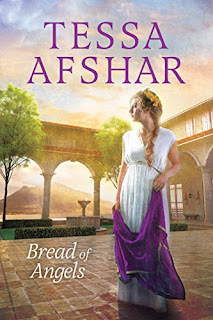Author: Tessa Afshar
Genre: Historical Fiction, Christian, Biblical Fiction
Publisher: Tyndale House Publishers
Release Date: 2017
Pages: 377
Source: My State Public Library
Synopsis: Purple. The foundation of an influential trade in a Roman world dominated by men. One woman rises up to take the reins of success in an incredible journey of courage, grit, and friendship. And along the way, she changes the world.
But before she was Lydia, the seller of purple, she was simply a merchant’s daughter who loved three things: her father, her ancestral home, and making dye. Then unbearable betrayal robs her of nearly everything.
With only her father’s secret formulas left, Lydia flees to Philippi and struggles to establish her business on her own. Determination and serendipitous acquaintances—along with her father’s precious dye—help her become one of the city’s preeminent merchants. But fear lingers in every shadow, until Lydia meets the apostle Paul and hears his message of hope, becoming his first European convert. Still, Lydia can’t outrun her secrets forever, and when past and present collide, she must either stand firm and trust in her fledgling faith or succumb to the fear that has ruled her life.
My Review: Bread of Angels tells the story of Lydia the Purple Seller, who was the first Christian convert in Europe from the Bible. Lydia loves making dyes with her father in Thyatira. However, her father is unjustly branded as a criminal and dies shortly afterwards. Lydia flees to Philippi and successfully starts her own dye business. Later, she meets Paul of Tarsus and his message inspires her to convert to Christianity.
Lydia of Thyatira’s conversion was one of the most inspiring stories in the New Testament. However, very little is known about her. Mrs. Afshar gave Lydia a fully fleshed out background. Lydia is a very relatable character. She is burdened by her betrayal and her father’s death. She defied societal expectations by being an unmarried woman with a successful business. Therefore, I admired Lydia’s tenacity to establish her own business. I also loved Lydia’s faith and her willingness to help others. Thus, Lydia was a very commendable protagonist.
Overall, this novel is full of betrayal, hope, and friendship. The message of this book is to not worry if you have faith with God and that he could set you free. I liked the characters in this book. They seemed very realistic. I also like that we get to revisit some of the characters from Mrs. Afshar’s previous novel, Land of Silence. My favorite part in the novel is Lydia’s baptism. There were some flaws in this novel. I found the villain to be unnecessary and could have been eliminated from the story. I also thought the romance was very underwhelming and seemed randomly thrown in. Thus, romance was not needed in this book. Nevertheless, I found Bread of Angels to be a very inspirational and thought-provoking read! I also like how Mrs. Afshar made ancient Greece come alive! Bread of Angels was a light and fast-paced read that will thrill readers from the first page! I recommend this novel for fans of Lydia, Woman of Philippi, Lydia, and The Woman from Lydia!
Rating: 4 out of 5 stars
Here is the official book trailer for Bread of Angels:


Comments
Post a Comment